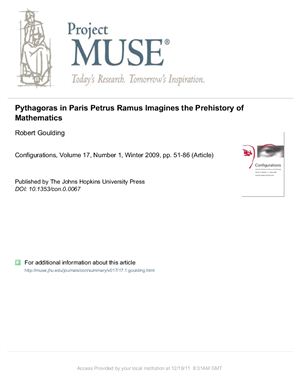Configurations
Volume 17, Numbers 1-2, Winter 2009
pp. 51-86
Subject Headings:
Mathematics - History.
Ramus, Petrus, 1515-1572.
Charpentier, Jacques, 1521-1574.
Pythagoras.
Abstract:
In 1566, Petrus Ramus and Jacques Charpentier, both professors at the University of Paris, clashed publicly over the tenure of a chair in mathematics at the Coll?ge Royale. Over the course of their contest—conducted both in the courtroom and through printed pamphlets—both authors constructed histories of mathematics that would portray the science in a way most favorable to each and his claim upon the disputed chair. Ramus, in particular, devoted his Prooemium mathematicum to an ambitious (though quite tendentious) history, in which he transformed the figure of Pythagoras from an other-worldly number mystic into a practical schoolmaster, who taught mathematics precisely along the lines that Ramus insisted the professor of mathematics should do. Ramus's creative reimagination of Pythagoras had very little to recommend it as a historical hypothesis, but his developing interest in Pythagoras and Charpentier's later caustic reaction anticipate quite remarkably later debates over the mathematization of nature.
Volume 17, Numbers 1-2, Winter 2009
pp. 51-86
Subject Headings:
Mathematics - History.
Ramus, Petrus, 1515-1572.
Charpentier, Jacques, 1521-1574.
Pythagoras.
Abstract:
In 1566, Petrus Ramus and Jacques Charpentier, both professors at the University of Paris, clashed publicly over the tenure of a chair in mathematics at the Coll?ge Royale. Over the course of their contest—conducted both in the courtroom and through printed pamphlets—both authors constructed histories of mathematics that would portray the science in a way most favorable to each and his claim upon the disputed chair. Ramus, in particular, devoted his Prooemium mathematicum to an ambitious (though quite tendentious) history, in which he transformed the figure of Pythagoras from an other-worldly number mystic into a practical schoolmaster, who taught mathematics precisely along the lines that Ramus insisted the professor of mathematics should do. Ramus's creative reimagination of Pythagoras had very little to recommend it as a historical hypothesis, but his developing interest in Pythagoras and Charpentier's later caustic reaction anticipate quite remarkably later debates over the mathematization of nature.

